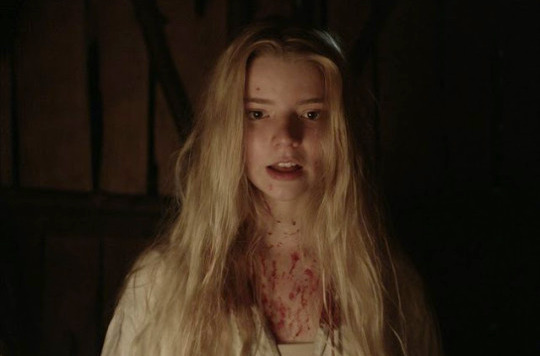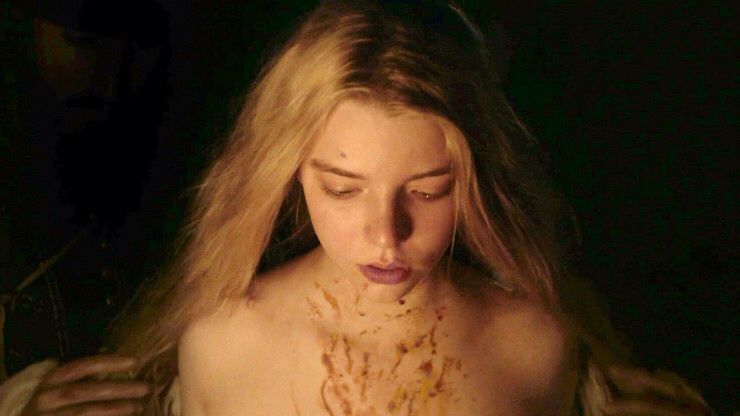
Hey everyone. Michael Cusumano here, excited to be back for a second season of The New Classics (and not just because publishing one of these every Tuesday will help me tell the weeks apart!) Each which we annoint one the best of the 21st century by discussing a single scene.
Scene: Living Deliciously
The ending of Robert Eggers’ The Witch certainly feels like a happy ending. How could it not, with that final thrilling image of a cackling Thomasin rising nude into the moonlight, embracing her place in Black Phillip’s coven? She has shed her fanatically repressed biological family like she shed her blood-splattered “shift” at Black Phillip’s whispered command, and now she’s off to see the world and taste butter by the churnful. Liberation!
But at what cost?

Black Phillip is elusive. When Thomasin asks “What will you from me?” Black Phillip directs her simply, sign his book. The specifics of Black Phillip’s price are saved for after the credits, but we can assume it will eventually leave her like the obscene crone we saw at the film’s beginning, living in a grimy woodland hut, slathering herself in gore. (Although, in fairness, that crone looked like she was having an absolute blast.)
Like the ending of Let the Right One In, The Witch’s climax might be deceptive, feeling less triumphant the longer you sit with it. Look again at what Black Phillip’s offering. It features the kind of slippery salesman talk you’d expect from Satan. Power and freedom are implied but not explicitly guaranteed. How could they be when she is selling herself into servitude? The allure of “see the world” comes close, but that’s awfully vague considering her immortal soul is on the line. The only explicit perks he lists are material, butter and a dress. To live deliciously, as he unforgettably frames it.
So it’s an economic negotiation when you boil it down, and not a challenging one since we witnessed B.P. and his minions systematically strip Thomasin of any family, possessions, or prospects until she is literally alone in the wilderness. At first blush, Black Phillip’s command that she disrobe before signing his book is about shedding Puritanical shame, but it is also stripping her down to complete vulnerability. One could argue it’s a win for Thomasin because she is at last exercising some agency, and she would have known what she was getting into because to her Hell was in no way a metaphorical concept, but really, what choice does she have?
It’s no accident that Phillip, who takes various forms over the course of the film, takes the form of a man in this final scene. Thomasin is trading one domineering man for another. Is it coincidental that Black Phillip’s wardrobe brings to mind the 1620 equivalent of a pimp? It would certainly fit with the fate of many a young girl who fled an abusive religious household.


And yet Thomasin’s fate still feels like victory. This owes a lot to the clever structure of Eggers’ screenplay. Most horror films would shroud the supernatural danger in mystery for at least the first act, but not Eggers, who dives right in with a soul-chilling infanticide in the opening minutes. Settling the question early focuses attention on the family unit, specifically the parents’ maddening inability to protect against this threat. If Black Phillip’s whole agenda is to get his hooves on Thomasin, her family certainly serves her up on a silver platter (or in a silver cup as the case may be). When you look at the scoreboard at the end of the film, you find Eggers’ battle between light and darkness was a decidedly one-sided conflict with Black Phillip needling and tormenting the family at will, while they splinter and collapse in a frenzy of impotent zealotry, paranoia and sexual hysteria. We nod along as Thomasin signs the Book of the Damned. At least she's free of that lot.
Unlike the religious fanatics from the horror genre’s past like Carrie’s mom and The Mist’s Mrs. Carrmody, Kate Dickey’s Katherine is entirely correct about supernatural evil pervading the world. Yet this doesn’t give her any special connection to the divine. To the contrary, her Puritanical fervor leads her to dwell more suspiciously on her daughter’s burgeoning womanhood than any dark forces outside her home. For all she and Ralph Ineson’s William invoke the Lord there is no evidence God is on their side. I suppose that’s why Thomasin’s choice in the end is so satisfying, even if in the back of our mind we suspect her newfound power will come at dreadful cost. Devil’s Bargain though it may be, at least you get the taste of butter. What exactly is God offering?

Season 1 of the New Classics
Follow Michael Cusumano on Twitter or Letterboxd
More on The Witch
Nathaniel's Top Ten List - #5 of 2016
The Furniture - On the Doom-laden Production Design
Raw Emotion - On Kate Dickie's supporting performance
Sundance Premiere 2015 - Michael's first encounter